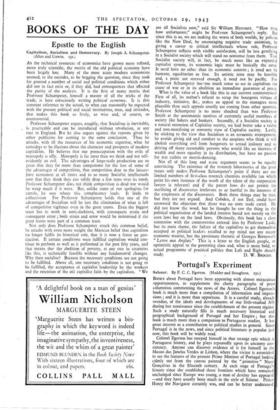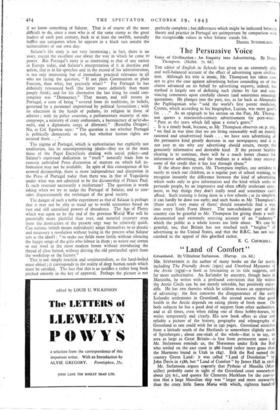Portugal's Experiment
Salazar. By F. C. C. Egerton. (Hodder and Stoughton. us.) BOOKS about Portugal have been appearing with almost miraculous opportuneness, to supplement the chatty paragraphs -of press columnists commenting the news of the Azores. Colonel Egerton's book is much more than a compilation of information and impres- sions ; and it is more than opportune. It is a careful study, already overdue, of the ideals and developments of our little-studied Ally during her renaissance since the establishment of the present regime. Such a study naturally fills in much necessary historical and geographical background of Portugal and her Empire ; but this book is much more than a companion to Portuguese studies. It has great interest as a. contribution to political studies in general. Since Portugal is in the news, and since political literature is popular just now, this book will be widely read.
Colonel Egerton has steeped himself in that strange epic which is Portuguese history, and he plays repeatedly upon its uncanny con- sistency. Anyone can discover evidence of it for himself in the Museo das Janelas Verdes at Lisbon, where the visitor is astonished to see the features of the present Prime Minister of Portugal looking calmly out from the canvas painted by the " primitive " Nuno Goncalves in the fifteenth century. At each stage of Portugal's history since she established those frontiers which have remained unchanged since Europe was young, a man of destiny has appeared —and they have usually been much in the style of Salazar. Prince Henry the Navigator certainly was, and can be better understood
if we know something of Salazar. That is of course all the more difficult to do, since a man who is of the same stamp as the great leaders of each past century, back to at least the twelfth, naturally baffles our categories when he appears in a black suit amidst the technicalities of our own day.
Salazar's life story is not very interesting ; in fact, there is no story, except the excellent one about the way in which he came to power. But Portugal's story is as interesting as that of any nation in Europe today, and Salazar's interpretation of it in doctrine and action, that is in his speeches and in the record of his hdministration,
is not only interesting but of immediate practical relevance. to all
who are facing the question, " If not plain Communism or plain Fascism, then what, but precisely what? " For Portugal he has definitely renounced both (the latter more definitely than many
people think), and for his alternative the last thing he could con- template was " Democracy?' That meant, and still means in
Portugal, a state of being " severed from its traditions, its beliefs, governed by a personnel improvised by political favouritism ; with its education in the hands of pedants, its religion in those of atheists ; with its police assassins, a parliamentary majority of nin-
compoops, a ministry of crazy enthusiasts, a bureaucracy of ne'er-do- wells, and a diplomatic corps of dilettanti." (Ramalho Ortigao.)
No, as Col. Egerton says : " The question is not whether Portugal is politically democratic or not, but whether human rights are secured there. . . ."
The regime of Portugal, which is authoritarian but explicitly not totalitarian, has its uncompromising ideals—they are in the main those of the Papal Encyclicals dealing with social policy—and Salazar's expressed dedication to " truth " naturally leads him to restrain unbridled Press discussion of matters on which full in- formation may not be available. In spite of this consequence of his avowed dictatorship, there is more independence and discussion in the Press of Portugal today than there was in that of Yugoslavia
under what was not admitted to be the dictatorship of Prince Paul. Is such restraint necessarily a misfortune? The question is worth asking when we try to judge the Portugal of Salazar, and to con-- sider dispassionately the technique of the good society.
The danger of such a noble experiment as that of Salazar is perhaps that it may not be able to stand up to world economics based on vast and still unrealised powers of abundance. The Age of Plenty which Was upon us by the end of the previous World War will be potentially more plentiful than ever, and material recovery even from the destruction of the present orgy may be relatively quick.
Can nations (which means individuals) adapt themselves to so drastic and necessary a revolution without losing in the process what Salazar sets as the ideal? : " to make our fields more fertile without silencing the happy songs of the girls who labour in them ; to weave our cotton or our wool in the most modern looms without introducing the thread of class hatred, without driving the old patriarchal spirit from the workshop or the factory." This is not simply reaction and sentimentalism, as the hard-boiled must object ; it corresponds to the reality of deep human needs which must be satisfied. The fact that this is so justifies a rather long book pitched entirely in the key of approval. Perhaps the picture is not
perfectly complete.; but differences which might be indicated between theory and practice in Portugal are unimportant by comparison with the recognisable values in what Salazar stands for.
DANIEL SUTHERLAND.



























 Previous page
Previous page